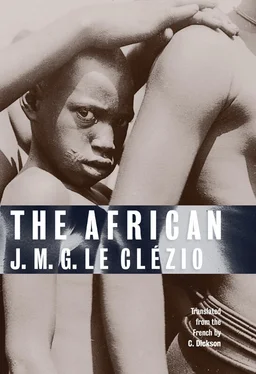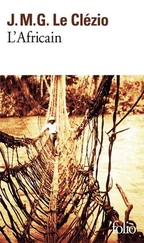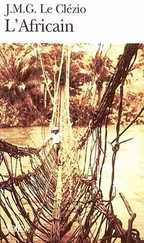Jean-Marie G. Le Clézio
The African
EVERY HUMAN being is the product of a father and a mother. One might not accept them, might not love them, might have doubts about them. But they’re there, with their faces, their attitudes, their mannerisms and their idiosyncrasies, their illusions, their hopes, the shape of their hands and of their toes, the color of their eyes and hair, their manner of speaking, their thoughts, probably their age at death, all of that has become part of us.
For a long time I dreamt that my mother was black. I’d made up a life story, a past for myself, so I could flee reality when I returned from Africa to this country, to this city where I didn’t know anyone, where I’d become a stranger. Then when my father came back to live with us in France upon his retirement, I discovered that in fact it was he who was the African. It was hard for me to admit that. I had to go back in time, start all over again, try to understand. I wrote this little book in memory of that experience.
I HAVE A FEW things to say about the face I was given at birth. First of all, I had to accept it. To say I didn’t like it would make it seem more important than it was to me as a child. I didn’t hate it, I ignored it, I avoided it. I didn’t look at mirrors. I think years went by without my ever seeing it. I would avert my eyes in photographs, as if someone else had taken my place.
Around the age of eight, I went to live in Nigeria, West Africa, in a fairly remote region where — apart from my mother and father — there were no Europeans, and where, to the child I was, all of humanity was made up solely of the Ibo and the Yoruba people. In the cabin where we lived (there’s a colonial tinge to the word cabin that might be offensive today, but it accurately describes the lodgings the British government provided for military doctors, a cement slab for the floor, four unplastered, cinder block walls, a roof of corrugated metal covered with leaves, no decorations, hammocks hanging from the walls to be used as beds and — the only concession to comfort — a shower connected with iron pipes to a reservoir on the roof that was heated by the sun), in that cabin then, there were no mirrors, no pictures, nothing to remind us of the world we’d lived in up until then. A crucifix that my father had hung on the wall, but with no human representation. That’s where I learned to forget. It seems to me that the erasing of my face, and of all the faces around me, dates back to the moment I entered that cabin in Ogoja.
Also dating back to that moment, or resulting directly from it, if you will, is the emergence of bodies. My body, my mother’s body, my brother’s body, the bodies of the young boys in the village with whom I played, the bodies of African women on the paths around the house or at the market by the river. Their stature, their heavy breasts, the shiny skin on their backs. The boys’ penises, their pink, circumcised glands. Faces, no doubt, but like leather masks, hardened, stitched with scars, with ritual markings. Protuberant bellies, navels that looked as if a flat stone had been sewn under the skin. The smell of bodies too, the touch of them, the skin that was not rough, but warm and light, bristling with thousands of hairs. I recall a feeling of extreme closeness, of many bodies all around me, a feeling I had never known before, a feeling that was both new and familiar, one that ruled out fear.
In Africa, the immodesty of bodies was marvelous. It lent perspective, depth, it multiplied sensations, wove a human web around me. It fit in with the Ibo country, the meanderings of the Aiya River, the village huts, their straw-colored roofs, their earth-colored walls. It shone out in those names that worked their way inside of me and meant much more than the names of places: Ogoja, Abakaliki, Enugu, Obudu, Baterik, Ogrude, Obubra. It permeated the great wall of the rain forest that stood around us on all sides.
When you’re a child, you don’t use words (and words don’t get used). Back then I was a very long way from adjectives, from nouns. I was incapable of saying, or even thinking: admirable, immense, power. But I could feel it. How the trees with their straight trunks soared up toward the night sky clamped over me, enveloping — as if in a tunnel — the bloody gash of the laterite road leading from Ogoja to Obudu. How acutely I perceived the naked bodies shining with sweat in the village clearings, the large silhouettes of women with children hanging on their hips, all of those things come together to form a coherent whole, free of lies.
I remember entering Obudu quite well: the road emerges from the shadows of the forest into the bright sunlight and leads straight into the village. My father stops the car, he and my mother have to talk to the officials. I am alone in the middle of the crowd, I’m not afraid. Hands are touching me, running along my arms, over my hair, around the brim of my hat. Among all the people milling around me, there is an old woman — well, I didn’t know she was old. I assume it’s her age that I remarked first because she was different from the naked children and the men and the women of Ogoja, dressed more or less in Western clothing. When my mother comes back (perhaps slightly uneasy about the gathering), I motion toward the woman, “What’s wrong with her? Is she sick?” I remember asking my mother that question. The naked body of that woman, full of folds, of wrinkles, her skin sagging like an empty water pouch, her elongated, flaccid breasts hanging down on her stomach, her dull, cracked, grayish skin, it all seems strange to me, but at the same time true. How could I have ever imagined that woman as my grandmother? And I didn’t feel pity, or horror, but rather love and interest, kindled by having glimpsed a truth, a real-life experience. All I can remember is that question, “Is she sick?” Strangely enough it still burns in my mind today, as if time had stood still. And not the answer — probably reassuring, perhaps a bit embarrassed — my mother gave, “No, she’s not sick, she’s just old.” Old age, probably more shocking for a child to see on a woman’s body, since ordinarily in France, in Europe — land of girdles and petticoats, of brassieres and slips — women are still exempt, as they’ve always been, from the disease of aging. I can still feel my cheeks burning, it goes hand in hand with the naïve question and my mother’s brutal response, like a slap. All of that remained unanswered inside of me. The question probably wasn’t: Why has that woman become deformed and worn with old age in that way? But rather: Why have I been lied to? Why has that truth been hidden from me?
Africa was more about bodies than faces. It was an explosion of sensations, of appetites, of seasons. The very first memory I have of that continent is my body being covered with little blisters caused by the extreme heat, a benign disorder that affects white people when they enter the equatorial zone, comically known as bourbouille — prickly heat in English. I’m in the cabin of the boat as it sails slowly down the coast past Conakry, Freetown, Monrovia, stretched out naked on the bunkbed, with the porthole hanging open to let in the humid air, my body sprinkled with talcum powder. I feel as if I’m in an invisible sarcophagus, or as if I am a fish trapped in the boat, coated with flour, before being put into the frying pan. Africa was already taking my face away and giving me a painful, feverish body in return, the body that France had hidden from me in the anemic comfort of my grandmother’s home, devoid of instinct, devoid of freedom.
In that boat bearing me away to another world, I was also being given a memory. The African present was erasing everything that had come before. The war, the confinement in the apartment in Nice (where in two attic rooms five of us lived, and sometimes even six, if you count the housemaid, Maria, whom my grandmother hadn’t been able to resolve to let go), the rationing, or the flight into the mountains where my mother had to hide for fear of being rounded up by the Gestapo — all of that was fading away, disappearing, becoming unreal. From that moment on, there was to be a before and an after Africa for me.
Читать дальше












